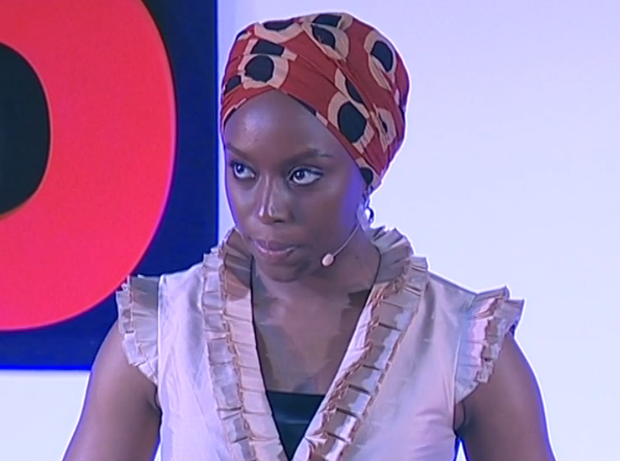Then one Saturday, we went to his village to visit,
后来的一个星期六,我们去Fide的村庄拜访,
and his mother showed us a beautifully patterned basket made of dyed raffia that his brother had made.
她的母亲向我们展示了一个精美别致的草篮--是Fide的哥哥用染过色的酒椰叶编织的。
I was startled. It had not occurred to me that anybody in his family could actually make something.
我当时完全被震惊了。我从来没有想过Fide的家人居然有亲手制造东西的才能。
All I had heard about them was how poor they were, so that it had become impossible for me to see them as anything else but poor.
在那之前,我对Fide家唯一的了解就是他们是何等的穷苦,正因为如此,他们在我脑中的印象只是一个字──“穷”。
Their poverty was my single story of them.
他们的贫穷是我赐予他们的单一故事。
Years later, I thought about this when I left Nigeria to go to university in the United States.
多年之后,在我离开尼日利亚前往美国读大学的时候,我又想到了这件事。
I was 19. My American roommate was shocked by me.
我那时19岁。我的美国室友当时完全对我感到十分惊讶了。

She asked where I had learned to speak English so well,
她问我是从哪里学得讲一口如此流利的英语,
and was confused when I said that Nigeria happened to have English as its official language.
而当我告知她尼日利亚刚巧是以英语作为官方语言的时候,她的脸上则是写满了茫然。
She asked if she could listen to what she called my "tribal music,"
她问我是否可以给她听听她所谓的“部落音乐”。
and was consequently very disappointed when I produced my tape of Mariah Carey.
可想而知,当我拿出玛丽亚凯莉的磁带时,她是何等的失望。
She assumed that I did not know how to use a stove.
她断定我不知道如何使用电炉。
What struck me was this: She had felt sorry for me even before she saw me.
我猛然意识到:在她见到我之间,她就已经对我充满了怜悯之心。
Her default position toward me, as an African, was a kind of patronizing, well-meaning pity.
她对我这个非洲人的预设心态,是一种充满施恩与好意的怜悯之情。
My roommate had a single story of Africa: a single story of catastrophe.
我那位室友的脑中有一个关与非洲的单一故事:一个充满了灾难的单一故事。
In this single story, there was no possibility of Africans being similar to her in any way,
在这个单一故事中,非洲人是完全没有可能在任何方面和她有所相似的;
no possibility of feelings more complex than pity, no possibility of a connection as human equals.
没有可能接受到比怜悯更复杂的感情;没有可能以一个平等的人类的身份与她沟通。












